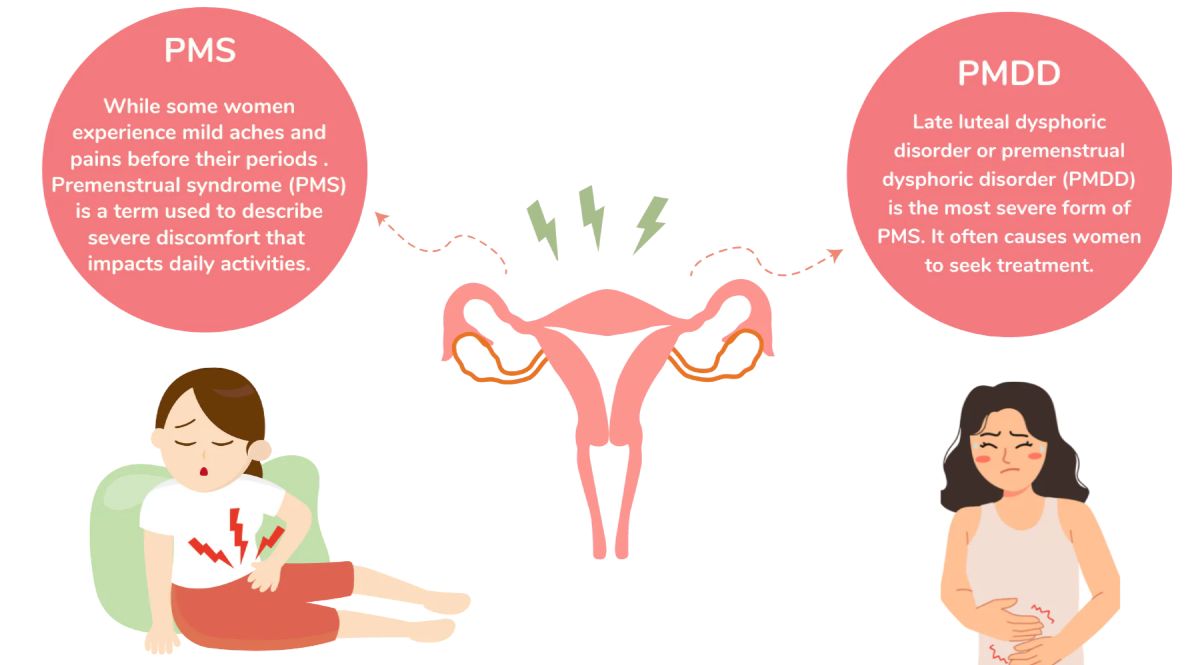When we talk about menstrual health, most of us are familiar with PMS. The constant mood swings, cramps and cravings that often come like clockwork. But what if there was something far more intense, misunderstood and damaging condition out there? Something that can affect not just the person experiencing it but also their partner and relationship?
I am talking about Premenstrual Dysphoric Disorder (PMDD), a condition that’s slowly getting the attention it deserves and it’s time we start talking about how it can affect not just individuals, but couples too.
This condition is not considered as an illness because of not many are aware of it. But do you know PMDD affects around 3% of the population? Think this isn’t a big deal? Well, compare it this way: Bipolar type 1 and Schizophrenia are found in 1% of the total population, and OCD affects 2% of the total population, YET all of them are a big deal. Now, imagine how serious PMDD can be.
What Exactly Is PMDD?
PMDD is not just a “bad PMS.” It’s a severe, chronic medical condition that affects around 1 in 20 women and people who menstruate. According to Dr. Benicio Frey (a psychiatrist in Hamilton, Canada) both PMS and PMDD are recognised through mental and physical symptoms in the luteal phase.

The mental symptoms include: emotional sensitivity, depression, anxiety, feeling overwhelmed, difficulty paying attention, memory issues and even suicidal thoughts. The physical symptoms on the other hand will include: breast tenderness, cramps, bloating, fatigue, increased appetite for carbs, changes in sleep, and changes in appetite.
All these are tightly linked to hormonal changes in the menstrual cycle.
“Both PMDD and PMS affect the quality of life, but PMDD brings the patient to the hospital,” says Dr. Anum Aziz, an Obstetrician-Gynecologist at Agha Khan University Hospital in Karachi.
Unlike other mental health conditions and mood disorders where the cause is often not easily pinpointed. Researchers and doctors have been able to identify the cause of PMDD: the brain’s sensitivity to hormonal changes. If the estrogen hormone is in deficit and progesterone is abundant, the brain will get emotionally unwell and irritated easily.
And while the person suffering from PMDD is obviously the primary victim of the condition, recent studies shed light on how romantic relationships also bear the weight of this invisible burden.
The Hidden Toll on Romantic Relationships
PMDD doesn’t just affect the person experiencing it, even their partners are often left confused, hurt, and helpless. The unpredictable mood shifts and emotional distance can make even the strongest relationships feel fragile.
Some described it as “walking on eggshells” for a week or more each month; unsure of what mood, emotion, or reaction might surface next.
When these experiences are repeated monthly and left unaddressed, they can seriously erode trust, intimacy, and communication between couples. And yet, the sufferer is often just as confused and distressed by their own behaviour, trapped in a cycle they can’t control.
“I’ve lost friendships and relationships because of this condition. People often don’t understand, or they grow tired of the inconsistency and unpredictability of my health. Being left behind or misunderstood by people I love has added another layer of grief and loneliness, fuelling further depression and anxiety,” says a victim of PMDD.
For many couples, it leads to repetitive conflicts, intimacy issues, and even emotional trauma. PMDD can also aggravate other pre-existing mental illnesses or traumas to make the patient suicidal which then deflects on the partner too. What happens in the end? Many relationships aren’t able to survive it.
A Misunderstood and Unseen Disorder
In Pakistan and many parts of the world, menstrual health is still shrouded in stigma and silence. The condition has even been linked to suicidal thoughts and tendencies, especially when left undiagnosed or unsupported.
What makes it even more heartbreaking is the lack of awareness and access to proper treatment. Many women suffer in silence, not knowing that their emotional upheaval could be a medical disorder, not a personal flaw.
So, can your relationship survive PMDD? The short answer: Yes, but only with understanding and support from their partner and lastly, medical help.
Stay tuned to Brandsynario for the latest news and updates

































